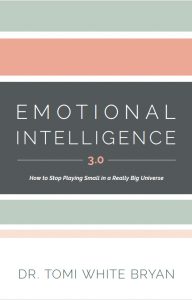
Intentional Working
Dr. Tomi White Bryan’s latest book helps organizations develop leaders
By Billy [Eye] Ingram
“You are a magical, creative ball of energy pretending you aren’t.” — Dr. Tomi White Bryan

Over the last few years, Tomi Llama (Dr. Tomi White Bryan, Ph.D, J.D) has written three self-help books that transcend the medium, definitely not the “I’m OK, You’re OK” type of navel-gazing that allows one permission to plow ahead and let the world adapt to whatever underlying, undiagnosed psychosis they may have in play. A quick search for “Karens destroying McDonald’s” on YouTube will show you where that’s led us.
Bryan’s first two books, The Toni Llama Purpose Guide: Emotional Maturity as a Path to Your Divine Purpose and What Is Your Superpower? are essential reading for anyone struggling with understanding why people respond to conflict — or even success — and react the way they do. Her third book, Hating Myself Every Step of the Way, no longer available, is undoubtedly one of the rawest, most honest assessments of a life lived that I’ve ever encountered. (Full disclosure: I typeset and formatted two of those books.)
Published by Houndstooth Press under her actual name, Bryan’s latest, Emotional Intelligence 3.0: How to Stop Playing Small in a Really Big Universe, is aimed toward helping organizations, coaching- and talent-development folks to better pinpoint potential and existing employees’ emotional maturity in order to fast track their way to a more satisfying and productive workplace experience, a mindful evolution benefitting everyone in the loop.
This blurb from the back cover of Emotional Intelligence 3.0 sums it up: “Every human being is born with unlimited creative energy — then life marks us up with red ink, teaching us who we’re supposed to be instead of who we really are. Before we know it, our greatest birthright has been crossed out, leaving most of us believing, ‘It’s not safe to be who I am.’”
I was fortunate to talk with Bryan over lunch about her groundbreaking new book, which is really more of a system, and this was one of the most illuminating conversations I’ve had in a decade. Since little of that brilliance was coming from my end of the table, let’s let the author speak for herself . . .
Dr. Tomi White Bryan: I left my corporate job in January of 2021 and started working on Emotional Intelligence 3.0, a condensation of everything I’ve ever read on abundance, self help, leadership, Western and Eastern philosophy. My dad was a university professor, I’ve taught at UNCG for a long time, North Carolina A&T and the University of Phoenix. So I approached this as an academician.
Life is getting more complex. Societal complexity is far outpacing human complexity right now. Yet we don’t have systems to deal with that because we, as people, need to become more complex to adapt to changing times.
How well are we doing at that?
Dr. Tomi White Bryan: We have within us what I call an “emotional scrap heap.” When it’s full and you do something to me, you’re going to get the full force and effect of that whole scrap heap because I haven’t cleared any of it out. You have to process those experiences. It used to be that nine little annoyances would happen to you during the day — somebody’d cut you off in traffic or whatever. Now, there’s like 27 or 30 triggers every day. As a result, 70 percent of the population lives in what is called “Protection mode.” What happens when our power is challenged is we go to conflict.
What affect does this have on the people around them in the workplace?
Dr. Tomi White Bryan: I love companies that say, “We have a values-based culture,” because right now toxic culture is rampant. Here’s the thing. If you, as an organization, want to live by your values, how do you get your people to do that if they don’t know how? So the first workshop we have is called “Aligning the Culture.”
And how does that work?
Dr. Tomi White Bryan: For people to find a job fit, there has to be a culture fit, which means that each person knows their values and can live by them. If they are aligned, they’re going to be engaged every day. Only one in 10,000 people know their values. Less than that know their strengths and their purpose. If they don’t know their purpose and how to live by it, they certainly can’t do it for the organization. So they hide, they blame, and they shuck and jive.
A couple years ago, there was a CEO round table where 250 of those Fortune 500 CEOs signed a statement saying, “We’re going to be Purpose Led.” Wonderful. Do your people know how to get there? Because if they don’t, that’s going to fail.
Basically, if someone is hiring a manager, director, vice president or C-suite, can organizations test the applicant’s emotional balance to determine what kind of leader they’re getting?
Dr. Tomi White Bryan: We’ve developed an activity called the Greatness Guide. According to leadership research by Dr. Zenger and Dr. Folkman, they’ve discovered the five fatal flaws that will derail effective leadership every time. One of those is not being accountable for your actions. Another one is not learning from your mistakes. Part of what I did is take those five fatal flaws and, instead of making them negative, I made them positive. That’s why it’s the Greatness Guide, the goal of which is disentangling from one’s adapted identity, but we have to do it in a certain way because, if you don’t, a person that is in Protection won’t hear me.
What’s the upside of exploring these behavioral responses?
Dr. Tomi White Bryan: With a leadership pre-screening to assess employees, it’ll let you know whether or not this person gets stuck in the drama triangle, what emotional state the person is in and whether or not they’re a good, medium or bad fit for a leadership role. You’ll know what kind of leader you’re getting.
So this manifests itself in the workplace how?
Dr. Tomi White Bryan: You’ve just had your annual review, a lot of organizations do this. What are you going to work on next year? How are you going to develop yourself? What we’ve done is, the organization can have all of their employees take this assessment and, based on where they are, build a five-year development plan. This is your current spot. Here’s your future spot. Here are the exact steps to get there. Here are the tools.
The desired result being…?
Dr. Tomi White Bryan: What you’re left with is an employee that’s much more in tune with what’s going on, not only internally with his job and his place in that organization, but also they can take these tools and apply it [them] to the rest of their lives. Emotional Intelligence 3.0 needs to be ingrained in everything we do, bringing human complexity up to where the structural complexity is.
There’s an old story that circulates, it was IBM or somewhere. This young kid makes a $10 million mistake and he’s called into the CEO’s office. The young man asks, “Am I gonna get fired?” The CEO says, “No, I just spent $10 million on your education. You’re not going anywhere.” That’s the type of culture that is agile and progressive. OH
Emotional Intelligence 3.0 : How to Stop Playing Small in a Really Big Universe will be available at Amazon and Barnes & Noble online on September 13.
Billy (Eye) Ingram has a new book out called EYE on GSO, a compendium of stories mostly taken from the pages of O.Henry magazine all about The Gate City’s rich history. For instance: When Greensboro, Charlton Heston with a cast of thousands and a camp filled with Nazis won World War II. Oh yeah!





